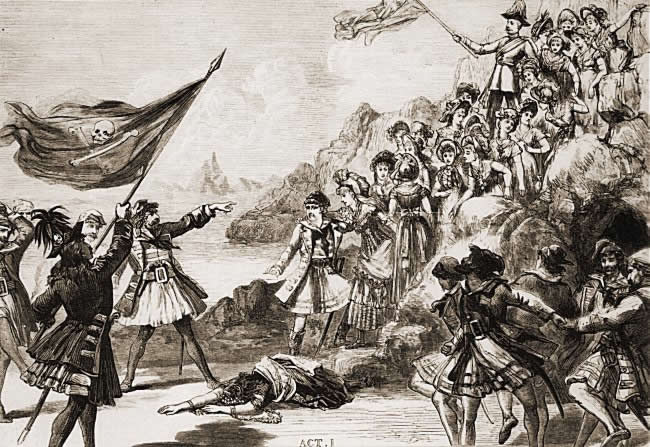
The Pirates of Penzance
The Pirates of Penzance; or, The Slave of Duty is a comic opera in two acts, with music by Arthur Sullivan and libretto by W. S. Gilbert. Its official premiere was at the Fifth Avenue Theatre in New York City on 31 December 1879, where it was well received by both audiences and critics.[1] Its London debut was on 3 April 1880, at the Opera Comique, where it ran for 363 performances.
For the 1983 film adaptation, see The Pirates of Penzance (film).
The story concerns Frederic, who, having completed his 21st year, is released from his apprenticeship to a band of tender-hearted pirates. He meets the daughters of Major-General Stanley, including Mabel, and the two young people fall instantly in love. Frederic soon learns, however, that he was born on 29 February, and so, technically, he has a birthday only once each leap year. His indenture specifies that he remain apprenticed to the pirates until his "twenty-first birthday", meaning that he must serve for another 63 years.[a] Bound by his own sense of duty, Frederic's only solace is that Mabel agrees to wait for him faithfully.
Pirates was the fifth Gilbert and Sullivan collaboration and introduced the much-parodied "Major-General's Song". The opera was performed for over a century by the D'Oyly Carte Opera Company in Britain and by many other opera companies and repertory companies worldwide. Modernized productions include Joseph Papp's 1981 Broadway production, which ran for 787 performances, winning the Tony Award for Best Revival and the Drama Desk Award for Outstanding Musical, and spawning many imitations and a 1983 film adaptation. Pirates remains popular today, taking its place along with The Mikado and H.M.S. Pinafore as one of the most frequently played Gilbert and Sullivan operas.
Act I
Act II
The Pirates of Penzance has been recorded many times, and the critical consensus is that it has fared well on record.[121] The first complete recording of the score was in 1921, under the direction of Rupert D'Oyly Carte, but with established recording singers rather than D'Oyly Carte Opera Company performers.[122] In 1929, The Gramophone said of a new set with a mainly D'Oyly Carte cast, "This new recording represents the high-water mark so far as Gilbert and Sullivan opera is concerned. In each of the previous Savoy albums there have been occasional lapses which prevented one from awarding them unqualified praise; but with the Pirates it is happily otherwise; from first to last, and in every bar, a simply delightful production."[123] Of later recordings by the D'Oyly Carte Opera Company, the 1968 recording (with complete dialogue) is highly regarded: The online Gilbert and Sullivan Discography says, "This recording is one of the best D'Oyly Carte sets of all time, and certainly the best Pirates",[124] and the Penguin Guide to Opera on Compact Disc also recommends it.[125] So too does the Penguin Guide to Recorded Classical Music, alongside the 1993 Mackerras recording.[126] The opera critic Alan Blyth recommended the D'Oyly Carte recording of 1990: "a performance full of the kind of life that can only come from the experience of stage performances".[127] The online Discography site also mentions the 1981 Papp recording as "excellent", despite its inauthentic 1980 re-orchestrations that "changed some of the timbres so as to appeal to a rock-oriented public".[128]
Of the available commercial videos, the Discography site considers the Brent Walker better than the Papp version.[129] More recent professional productions have been recorded on video by the International Gilbert and Sullivan Festival.[130]
Selected recordings
General
Lists of productions